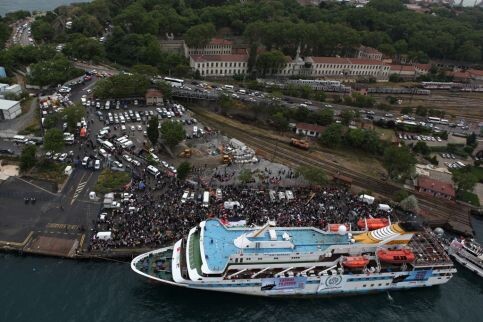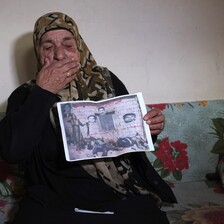The Electronic Intifada 29 May 2010

A ship with the Freedom Flotilla prepares to set sail for Gaza. (Free Gaza)
No one can accuse history of not having a sense of irony. Sixty-three years ago in July 1947 a passenger ship destined for Palestine and named The Exodus was stopped and boarded by the British Navy. The ship was crowded with Holocaust survivors determined to make a new life for themselves in British controlled Palestine but did not have official immigration permits. Facing terrorism by Zionist organizations, waves of illegal immigration by Jews fleeing the displaced persons camps in post-war Europe, and resistance by Palestinian Arabs to the increasingly powerful and belligerent Zionist movement emboldened by its growing numbers, Britain was determined to stop the ship. Accordingly when the Royal Navy boarded the ship twenty miles out from Haifa a full scale battle ensued. Three of the immigrants were killed and dozens injured as British troops beat the passengers on to three separate prison ships. From there these Holocaust survivors were transported back to Germany and were once again placed in camps. The world was horrified; an American newspaper ran the headline, “Back to the Reich.” Delegates from the UN Special Commission on Palestine who watched what occurred were similarly shocked; the Yugoslav delegate cited that what happened to The Exodus “is the best possible evidence we have for allowing Jews into Palestine.”
Since then the fate of The Exodus has achieved legendary status: Leon Uris used it as the basis of his 1958 bestseller of the same name; an award winning film starring Paul Newman came out in 1960. Indeed, The Exodus the book and film, painted an exceedingly favorable portrayal of the Zionist movement and the fledgling state, arguably helping the US and Europe to overcome their guilt for historic anti-Semitism and inaction during the Holocaust by supporting Israel. Former Israeli Foreign Minister Abba Eban drew a direct link between The Exodus story and the ending of British rule in Palestine. Tellingly a 1996 documentary celebrating the story is entitled, Exodus 1947: The Ship That Launched A Nation.
Today another small flotilla of ships is making its way to Palestine. Crammed with humanitarian aid and some 600 international peace activists and human rights workers it is set for Gaza.
Synonymous with violence and poverty Gaza is home to 1.5 million dispossessed and imprisoned Palestinians. Under Israeli control since 1967 Gaza has seen it all and been through it all. Yet the events of the last two years are without precedent. Under blockade since 2007, bombarded in a three week long assault that is called a war, its people have been barely subsisting since. As Dov Weissglas, an advisor to then Israeli Prime Minister Ehud Olmert, explained in 2006, Palestinians were to be “put on a diet.” Today much that is essential for everyday life in Gaza is banned — for either “security reasons” or because they are “luxury items”: cement is banned, pencils banned, paper banned, toys banned, medicines and food restricted.
Of course you can agree with all this and say it is “the terrorist” organization Hamas that is to blame. You can say that even though all this is illegal under international law it is necessary for Israel’s security. Or you can ask how banning toys is fighting terror?
Like Mary Robinson after the war you can be shocked of course: “Their whole civilization has been destroyed, I’m not exaggerating … It’s almost unbelievable that the world doesn’t care while this is happening.” Or you can believe Israel’s Foreign Minister Avigdor Lieberman: “There is no humanitarian crisis in Gaza. Despite Hamas’ war crimes against Israeli citizens … Israel continues to respond in the most humane way possible.”
Regardless of whom you choose to believe, this weekend you are likely to see another example of Israel’s humanity. Reportedly a quarter of Israel’s Navy has been mobilized to ensure the aid flotilla does not get through. The Israeli press reports that just like the British all those years ago, plans have been made to stop the aid flotilla twenty miles out to sea and transfer the passengers to holding camps or prisons inside Israel before deporting them. For Israel’s foreign minister this is not an aid convoy, but “a blatant provocation” and “violent propaganda.” Which is odd really since the convoy, if left unimpeded, will not go near Israel.
However, even if Israel does stop the convoy it should be aware that its position on blockading a whole people is not sustainable. At the time of The Exodus affair future Israeli Prime Minister Golda Meir declared: “To Britain we must say: it is a great illusion to believe us weak. Let Great Britain with her mighty fleet and her many guns and planes know that this people is not weak, and that its strength will stand it in good stead.” Replace Great Britain with Israel and the same applies today.
Richard Irvine teaches a course at Queen’s University Belfast entitled “The Battle for Palestine” which explores the entire history of the conflict. Irvine has also worked voluntarily in Palestinian refugee camps in Lebanon and taken part in olive planting and harvesting in the West Bank.





